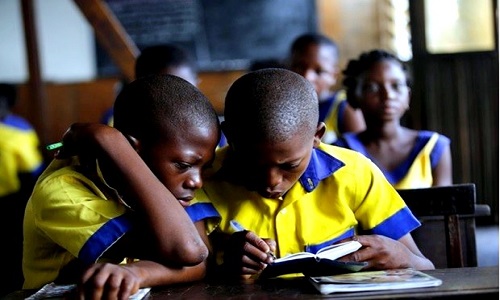by Tayo Adelana
Brief about UBE Programme
The Universal Basic Education (UBE) Act 2004 was enacted by the Federal Government of Nigeria with the primary aim of achieving Education for All (EFA), reducing school drop-out(s) and out-of-school children, improving quality and efficiency of basic education, and promoting the acquisition of literacy, numeracy, life skills and values for life long education and useful living. To achieve these aims, the Federal Government of Nigeria declared education from primary to junior secondary school free and compulsory, and a fundamental right of all school-age pupils.
UBE Funding
As part of the Federal Government’s commitment to ensuring successful implementation of the Universal Basic Education (UBE) programme by States and Local Governments, 2% of Nigeria’s Consolidated Revenue Fund (CRF) is dedicated to supporting States of the Federation in providing access to quality education especially in providing the much needed infrastructure to implement the UBE programme. Every State in Nigeria including the Federal Capital Territory (FCT) is required to provide an equal amount as counterpart fund contribution in order to access/draw-down the matching grant, in accordance with Section 11(2) of the UBE Act, 2004. In other words, for any State to qualify for the grant, such State shall contribute not less than 50% of the total cost of projects as its commitment in the execution of the project(s). Consequently, each State Universal Basic Education Board is expected to prepare and submit an Action Plan to Universal Basic Education Commission (UBEC) for vetting and approval before the matching grant could be released.
It is worthy of note that the 2% dedicated to UBE programme has been increased to 3% recently by the National Assembly of the Federal Republic of Nigeria. This without doubt is expected to reduce State Governments contribution as counterpart fund to the cost of projects to be executed.
What is Action Plan?
Action Plan is an annual document prepared by State Universal Basic Education Board (SUBEB) of each State showing breakdown of intervention projects or activities to be implemented in public primary and junior secondary schools. This document usually details project description, beneficiary schools, quantity, locations, unit costs, total costs and duration for execution.
Why you need to know the content of Lagos SUBEB Action Plan
It is a fact that virtually all the State Universal Basic Education Boards (SUBEBs) in Nigeria are not willing to publicise their Action Plans despite the fact that these are public documents that should have been proactively published in accordance with Section 2 (4) of the Freedom of Information (FOI) Act, 2011.
Public access to SUBEBs’ Action Plans is supposed to enhance or boost civic participation in the area of monitoring and tracking of funds utilization. More so, the availability of the Action Plans in the public domain will enable stakeholders especially at the community level, make inputs into the implementation processes.
Therefore, it is the right of every citizen/stakeholder to demand for their State’s SUBEB Action Plan in order to:
- Be aware of project(s) to be implemented in their communities/LGAs to ensure compliance and avoid diversion of project(s) to other locations not stated in the Action Plan
- Know the unit costs and total costs of planned projects to avoid misappropriation of funds meant for the project(s)
- Know duration for completion of project(s) to avoid not completing/abandoning project(s)
- Check-mate the use of sub-standard materials for infrastructural projects which could endanger the lives of pupils
- Ensure teachers and pupils have access to teaching and learning environment that is conducive.
- Ensure transparency and accountability in the implementation processes.
